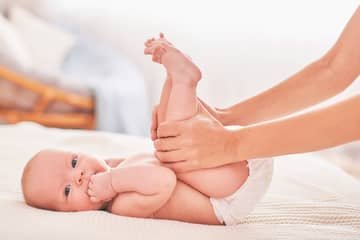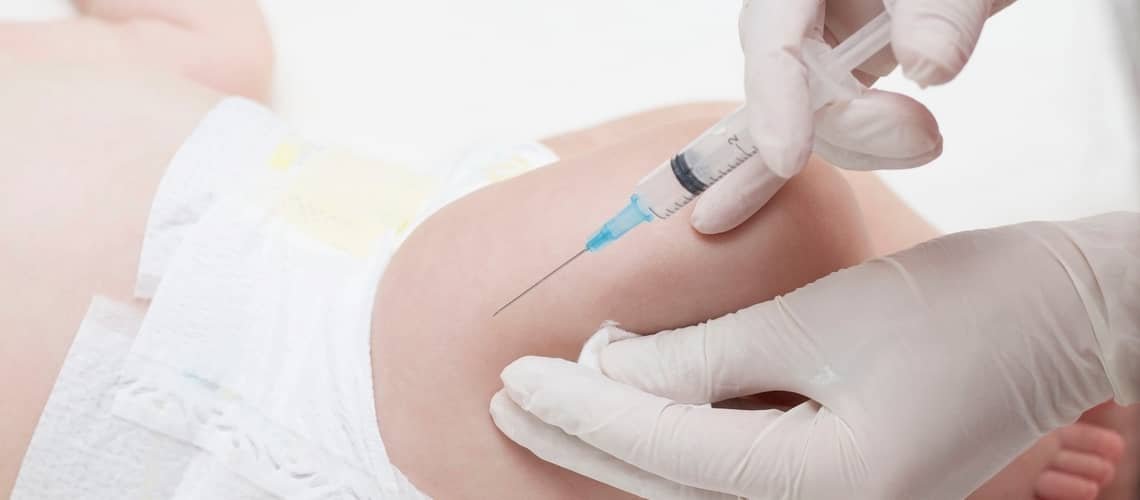
Baby's first vaccination - experience, reactions (temperature, swelling, redness)
The first doctor's visits after the birth of a baby can cause nervousness and fear in parents. This is one of the most important parental duties that an adult must include in his life for the next 18 years. The first vaccinations are part of the primary health examinations of the newborn. They often bring with them certain side effects that require the careful attention of parents. While some reactions of the child's organism are considered normal, others need to be consulted with a doctor.
What care does the child require after the first vaccination? What reactions of the baby to the first vaccination are considered normal? Which symptoms are better to deal with as part of medical care? You will find answers to these and other questions regarding the first vaccination in the following article.
Preparation for the first vaccination of a newborn
Parents must be informed about the dates of individual vaccinations and their interval by the pediatrician they have chosen for their baby in advance. When setting vaccination dates, however, it is necessary for parents to be in contact with a doctor, especially if certain complications occur before the day of vaccination. Complications mean changes in the child's health, such as increased temperature, loss of appetite, vomiting or other stomach problems. In order for parents to avoid such inconveniences before the fixed date of vaccination, it is necessary to limit the baby's contact with large groups of people or visitors a few days before vaccination. Of course, the child does not need to be completely isolated from the outside world for vaccination. It is enough to implement certain rules, thanks to which there will be no possible infection preventing vaccination.
These principles should mainly consist in limiting visits and travel to foreign countries. So, it is not necessary to skip walks around the neighborhood and in nature before the first vaccination of the newborn. However, if there is any contact with a person showing signs of illness or if the parents traveled abroad with the child, it is necessary to inform the pediatrician about these facts. The doctor needs all the information that could in some way influence the action of the vaccine. Immediately after arriving at the pediatrician's clinic, it is therefore good for parents to summarize all aspects of their child's health. This includes not only possible changes in the baby's health status or sleeping pattern over the last few days, but also trips abroad or the child's contact with anyone who was suffering from any acute illness at the time. Based on this information and the medical examination, the pediatrician will then decide whether it is possible to give the first vaccination to the newborn.
In the event that the vaccination takes place without any problems, parents are advised to spend at least half an hour in the pediatrician's waiting room. This time interval is decisive from the point of view of the emergence of a potential allergic reaction of the baby to the administered vaccine. When these necessary 30 minutes have passed, the doctor examines the child again and, in the absence of signs of an allergic reaction, sends the patient home. Careful care of the baby should follow at home. As a result of the vaccination, certain signs of deteriorating health may begin to appear.
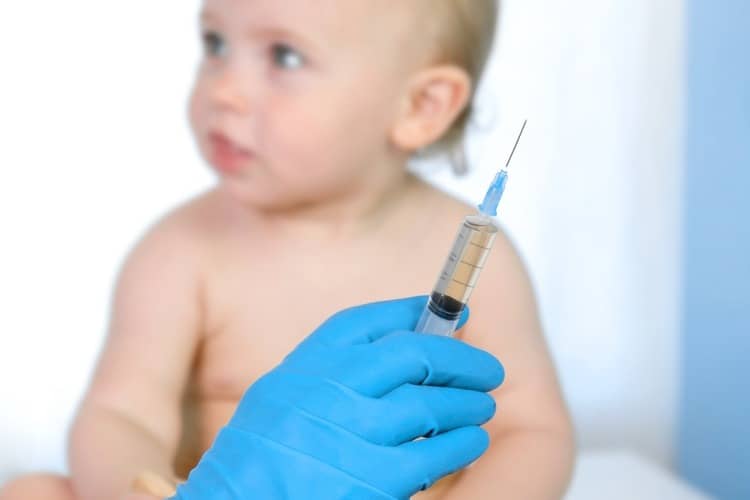
What to do after vaccination?
Caring for a baby after the first vaccination is similar to the vaccination of older children or adults. It is necessary to follow a regimen based on a sufficient amount of rest, while excessive movement or loading of the injection area should be excluded.
It is important that the baby is not left unattended. After the first vaccination, it is essential that parents carefully monitor and observe even the smallest change in their child's health. The presence of a close person can also significantly reduce the restlessness of a sick vaccinated baby.
The baby's first vaccination and the body's reactions
The most common and relatively harmless side effects of the first vaccination should disappear within 24 to 48 hours after the vaccine is administered. If the parent notices their persistent effects, it is advisable to visit the pediatrician again.
After the baby's first vaccination, the temperature is an unwelcome but very common companion, which can mostly be avoided by administering anti-fever drugs . The child can use them only if the temperature exceeds 38 °C . Fever after vaccination usually occurs already in the evening, most often within 12 hours after the administration of the vaccination dose. However, there are vaccinations after which the first signs of increased temperature appear only after 8 or 10 days . Such a phenomenon is characteristic of the MMR vaccination that protects the child against mumps, measles and rubella . The first dose is given in the 15th month of the child's life. Regardless of which of the above situations the parents find themselves in, it is essential that the child be supplied with the necessary nutrients , or enough fluids. For breast-fed children, these substances must, of course, be administered through breast milk.
Common reactions of the baby's body to the first vaccine include fatigue and aversion to food. So it's no surprise that there are some breastfeeding problems at this time. From the mother's point of view, in this situation, it is necessary to arm yourself with sufficient patience and determination to feed your baby, despite the fact that he has no taste for milk at all.
Administration of the vaccine also comes with another physiological side effect, namely unpleasant pain at the injection site. This area of the child's body is extremely sensitive and irritated after vaccination, and visible symptoms include mainly swelling and redness.
An effective means of pain relief is the application of cooling plasters for children after vaccination. It is recommended to leave the compress on for at least 20 minutes, after which it must be removed from the injection site. Children are very sensitive to sudden changes in temperature, so it is good to apply this pain reliever with certain breaks.
An irritated mood due to soreness and increased temperature often manifests itself in the form of an increased frequency of crying. There is no need to despair, because the psychological and physiological symptoms will disappear after a few days after the first vaccination. A positive sign is that their presence means that the immune system is reacting to the vaccine substance in the baby's body.
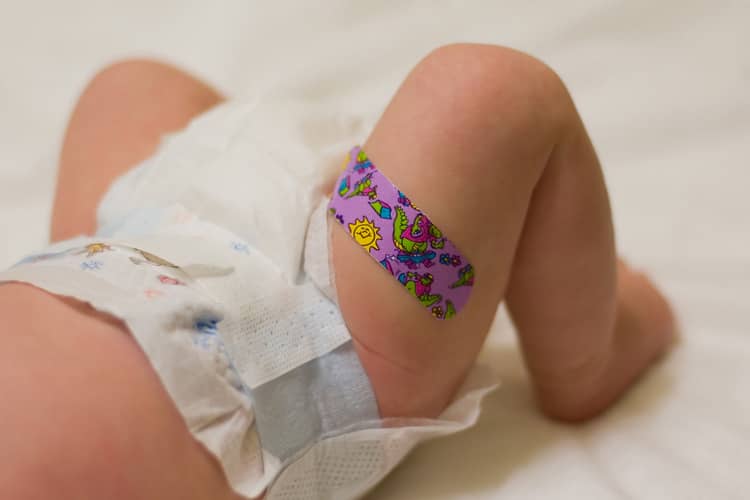
Symptoms after the first vaccination requiring medical attention
While a slightly elevated temperature for one to two days is considered a normal reaction of the child's organism to the first vaccination, a persistent fever above the level of 40 °C is dangerous for the baby and therefore requires immediate medical attention. From the point of view of temperature, it is necessary to pay attention to the time interval between the administration of the vaccine and the first signs of increased temperature . If the fever does not occur until two days after the dose, it may indicate a more serious side effect of the vaccination. However, this does not apply in the case of vaccinations that are literally characterized by a delayed onset of fever (MMR vaccine).
Parents should also carefully observe the injection site, which may indicate a more serious reaction of the child's body to the administered vaccine due to significant swelling and suppuration. It is also necessary to consult a doctor if there is redness in the area of the first vaccination only two days after the date of vaccination.
Other symptoms requiring medical attention include limited mobility and limpness of the baby's limbs. Non-stop crying lasting more than three hours is not a good sign, and high-pitched crying lasting more than one hour is also suspicious.
If the parent notices any disturbances in the child's consciousness, convulsions or repeated stomach problems in the form of vomiting or diarrhea, it is necessary to inform the relevant pediatrician about this situation. Of course, if these symptoms occur outside of the doctor's office hours, it is ideal to visit the nearest pediatric emergency room.
A specific case is the first vaccination against measles, which is part of the MMR vaccine mentioned above. Some babies may develop rashes. Such a reaction of the immune system, however, appears in most cases only after an interval of 6 to 12 days. Measles vaccination rashes are normal if they have a pinkish color. This manifestation of the vaccine is not contagious to other children , and therefore it is safe to stay in public spaces. The problem arises if the rashes have a blood-red color, while their presence on the baby's skin persists for more than three days. Such a situation already requires medical assistance.
This should be sought in the case of any vaccine that causes seizures, swelling of the throat and airways, rapid heartbeat or pale skin in the child. However, the listed symptoms are among very rare, but at the same time extremely serious.
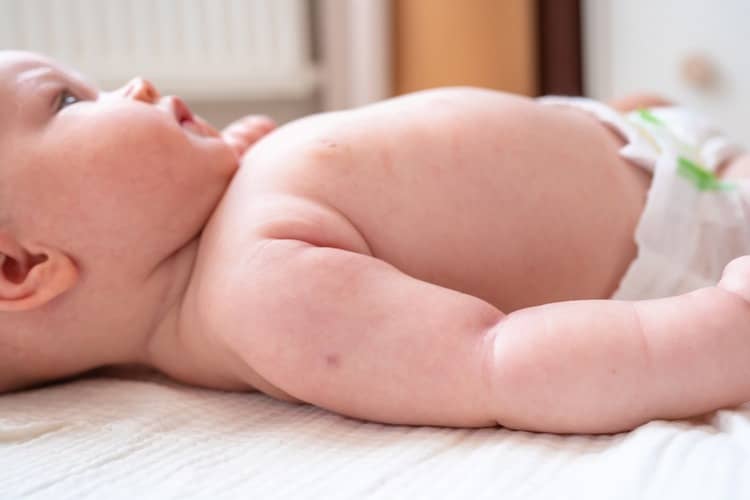
Baby's first vaccination - experience
Most experiences with the first vaccination take place in the form of a stressed mother and a calm child who has no idea that something groundbreaking awaits him. Several discussants confirmed that there is a need for consistent communication with doctors who can fully understand the nervousness of parents of newborns.
Some women recommended that mothers share the first childhood vaccinations on different dates, thereby avoiding the inconvenience of compounded symptoms due to the administration of several vaccines at once. However, it is necessary to get cooling plasters and anti-fever medicines for home supplies in advance. They added that it is advisable to administer the first vaccinations to the baby during breastfeeding or in a lying position on the mother's chest. Both the child and the mother are calmer. After that, all that remains is to take care of fathers who can be overly sensitive to their children's cries as a result of the painful vaccination.
The most frequent questions - FAQ
Have you read our entire article on the first vaccination of newborns, but your questions remain unanswered? Do not hesitate to take a look at the question and answer section, where we have summarized several other interesting aspects related to this issue. In the event that even this part did not satisfy your curiosity, state your comments and possible questions in the comments section. We try to respond to them quickly and promptly.
Is it normal if the baby does not have any symptoms after the first vaccination?
Are there specific side effects for each vaccine?
Can you travel with your child if he has just received his first vaccination?
Is it normal for a child to have signs of swelling at the injection site only after three days?
Pridať komentár




